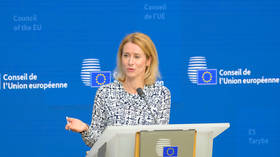russia today - 8/12/2025 11:02:06 AM - GMT (+3 )

The diplomat has claimed the bloc is working on “more military support for Ukraine”
EU foreign policy chief Kaja Kallas has called for more pressure on Moscow ahead of a summit between Russian President Vladimir Putin and his US counterpart, Donald Trump.
Foreign ministers of the bloc’s member states held an urgent video-conference on Monday, after it was announced that the Russian and US leaders will meet face-to-face in Alaska on August 15 to discuss the Ukraine conflict and other issues.
Following the discussions, Kallas issued a post on X to offer the bloc’s “support for US steps that will lead to a just peace” between Moscow and Kiev.
“Transatlantic unity, support to Ukraine and pressure on Russia is how we will end this war and prevent future Russian aggression in Europe,” she insisted.
According to the foreign policy chief, the EU is currently working on “more sanctions against Russia, more military support for Ukraine, and more support for Ukraine’s budgetary needs and accession process to join the EU.”
On Monday, Trump confirmed he will consult with Ukraine’s Vladimir Zelensky and the leaders of Kiev’s Western European backers before his summit with Putin. “I am going to get everybody’s ideas. I go into that thing fully loaded right up there – and we’re going to see what happens,” he said.
The comments by Kallas echoed a joint statement “on peace for Ukraine,” issued on Sunday by the leaders of France, Germany, the UK, Poland, Italy, and Finland, and European Commission President Ursula von der Leyen.
Russian Foreign Ministry spokeswoman Maria Zakharova responded by describing the statement as “another Nazi-style pamphlet,” noting that the cessation of hostilities demanded by the EU and UK does not include stopping the supply of weapons to “Kiev terrorists.”
Moscow has repeatedly said it is interested in a peaceful resolution to the Ukraine conflict, but has insisted that the root causes of the crisis must be addressed in order to bring a permanent and stable peace. Russian Foreign Minister Sergey Lavrov previously said that “unlike [Western] Europe… which completely ignores the root causes of the current situation, in the US there is a desire to get to the bottom of this issue.”
read more




